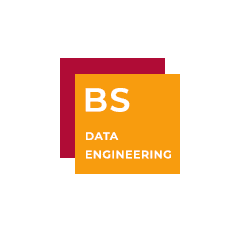
Associate to Bachelor of Science in Data Engineering
Get trained in the rapidly growing field of big data in the real world to provide clean, usable data for businesses.
Overview
 Why Data Engineering
Why Data Engineering
The world is revolving around data. Managing data is a challenge that all industries are facing today. Data engineering saw a 50% growth in open roles in 2020. In the U.S., we see an average salary of $113,259, with 9.3% growth over the previous year. Companies like Amazon, Accenture, and Capital One are all trying to hire for data engineers at a large scale, and, as a result, the average time to fill for data engineers is 46 days.
Organizations are grappling with using vast amounts of data to gain valuable and actionable insights. Therefore, there is a great demand today for positions such as Data Scientist, Data Analyst, and Data Engineer in various fields. Key business decisions should always be made after large amounts of data have been collected and analyzed.
Sollers Data Engineering program is designed to learn all from the basics of Computer Science, Linear Algebra, Programming Introduction to advanced topics like Big Data, Data Mining, and Analytics. The final Capstone Project will give a culminating academic and intellectual experience for students.Join this course immediately and become a future Data Engineer.
Learning Outcomes
- Design, construct, install, test, and maintain highly scalable data management systems.
- Build high-performance algorithms, prototypes, predictive models, and proof of concepts.
- Employ a variety of languages and tools to marry systems together.
- Install and update disaster recovery procedures.
- Create custom software components and analytics applications.
- Recommend ways to improve data reliability, efficiency, and quality.
- Collaborate with data architects, modellers, and IT team members on project goals.
- Learn to design data models, build data warehouses and data lakes, automate data pipelines, and work with massive datasets.
- Learn how to use batch processing and real-time processing.
- Translate complex analysis problems into iterative or multi-stage Spark scripts.
- Use Spark programming to explore and transform massive datasets at scale by writing high-performing. programs.
- Learn about different applications of data mining and get experience working with data mining algorithms.
- At the end of the program, you will combine all your new skills by completing a capstone project
Syllabus
Register now, to get the complete syllabus.
Work with the latest tools











Course Duration
 Starting soon
Starting soon
Reserve your spot
 Limited seats only
Limited seats only
Reserve your spot
For information regarding fee and/or reserving your spot, contact our Admissions Team.
Credit transfers applicable for alumni

Career Guidance
After the completion of program, we assist our students with interview coaching, resume building sessions, conduct mock interviews, job readiness training and make them competent to venture into the corporate world.
We provide exclusive one-on-one sessions with our industry-based career advisors who provide guidance right from resume feedback, assisting with interview Q&As, and helping with job preparations.

Student Testimonials
Campus Visit
FAQs
According to Marketwatch, a Bachelor’s Degree holder will earn over 26% more money than an Associate’s degree holder with similar experience. Higher education has never been more important, in today’s fast-paced, technology-driven, highly competitive world. While you don’t have to invest in 4-5 full years in education if you don’t want to, getting an accelerated Bachelor’s degree like this one will definitely allow you to take few special courses and give you a head-start to set you on a right career track.
The high growth of the industry and career prospects in data analytics are already stated in the introduction above. There is practically no other comparable bachelor’s degree program in data engineering in the market today: that’s right, this is the first-of-its-kind accelerated bachelor’s de-gree to help you start in the lucrative career in data engineering in almost half the time and investment you’d have to put in a traditional masters or bachelors degree. Once you sign up, you get the training as well as relevant experience through our capstone project and hands-on tools, to show for your first job – something that is extremely hard to get these days. Our career services team prepares you through career counselling, resume reviews, mock interviews and soft skills training. Not convinced yet? Contact us to discuss how we can specifically help you and how exactly can this program add value to your career.
This is an accelerated bachelor’s program. This associate to bachelor’s degree program is for total of 72 credits, and can be completed in a year and a half to two years.
Yes, we can allow credit transfer upon certain conditions; however, each request will be evaluated case-by-case basis. Please contact us on [email protected] to learn more.
There are no prerequisites, except that you need an Associate degree, preferably in any of the STEM fields.
One of the key highlights of this program is the internship and hands-on, practical projects – all of which give you the relevant experience to not only understand and talk intelligently about data analytics, but help you get that first job in the industry. You will gain extensive practical sessions Oracle SQL, Hadoop, MapReduce, object-oriented languages such as Java, Python, R/ R Studio. In addition, you will work on real-world applications, through case studies, projects, big data-sets and a Capstone project.
Industry Facts
According to McKinsey, the US could face a shortage of 140,000 to 190,000 people with deep analytic skills and 1.5 million managers and analysts with the know-how to use the analysis of (big) data to make effective decisions in 2018. Annual demand for the fast-growing new roles of data sci-entist, data developers, and data engineers will reach nearly 700,000 openings by 2020. The finance, insurance, professional services, and IT in-dustries have the greatest demand for data scientists, data developers, and data engineers.



